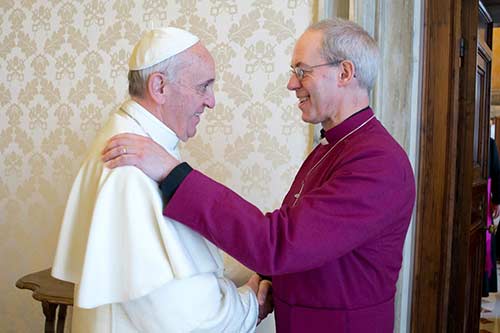
It began with changing worship from Latin to the vernacular English. Along the way, celibacy for clergy became optional. Monasteries closed down. The Bible stopped being heard in Latin and began being read publicly in quality English translation, with longer, better organised, and an increased number of readings. Laity were also encouraged to read the Bible for themselves… Then, synods were introduced… Women began to lead parishes, and authorised to publicly administer sacraments… increasingly individuals made up their own minds rather than obeying central authority…
But, this isn’t a description of the 16th and 17th Reformation in England that led to the development of the contemporary Anglican Communion. No, this describes the (uncannily-similar) reformation of Roman Catholicism four centuries later.
And so, possibly unsurprisingly, more recently there came the authorising of the blessing of same-sex couples.
I have already reflected on the content of the Fiducia Supplicans declaration [FS] which allows Roman Catholic [RC] clergy to bless same-sex couples (and couples in an “irregular relationship”). Here, I am now reflecting mainly on the response to FS.
In the fortnight since its publication, there is, now, an unprecedented list of RC bishops conferences and individual bishops who not only publicly disagree with Pope Francis’ FS, but are forbidding its implementation, and also publicly calling on the Pope to revoke the Declaration.
It is important to highlight that FS is a document at the highest level of authority – a “Declaration”. The previous Declaration was 24 years ago, and the one before that was 44 years ago! Such a document of this level of authority is rare. The most common popesplaining of the Declaration is that Pope Francis is simply highlighting that anyone can receive an informal, spontaneous blessing. And that includes individuals in a same-sex or irregular relationship. But that is not what the Declaration is clearly saying. If that were merely what the document was teaching, it would not be required to be at the highest level of authority, it would not need a Declaration. And the Declaration itself would not be highlighting that what it contains, pertaining to Church teaching and practice, is a “…real development … broadening … enriching … evolving…”.
The reaction to FS is (again remarkably) very reminiscent of the debate within the Anglican Communion around pastorally responding to same-sex couples: the RC Germans and Belgians are in the role of USA’s Episcopal Church; the RC Africans are playing the same role as they do within Anglicanism; and so forth…
Do note, in all this, that in RC teaching,
The Pope enjoys, by divine institution, “supreme, full, immediate, and universal power in the care of souls”
Catechism of the Catholic Church 937 – Vatican II Decree on the Pastoral Office of Bishops 2
But this understanding of the Bishop of Rome as having universal jurisdiction, universal supreme and full power in every place, is being eroded, contradicted in fact, in practice now by RC bishops, bishops conferences, congregations, and other RC ecclesiastical authorities. The effect is to limit the Bishop of Rome more prominently now as first among equals, a title regularly given to the Archbishop of Canterbury within the Anglican Communion.
Many commentators are seeing parallels between the approach of Pope Francis (affirm the doctrine of marriage; allow for the blessing of same-sex couples separately from marriage) and the Anglican approach found in Aotearoa, New Zealand and Polynesia, and now in the Church of England. There is even suggestion that the Pope and the Archbishop of Canterbury discussed this approach on their flight home from their joint pilgrimage for peace to South Sudan in February 2023.
It is early days in the reaction to FS, but, in many ways, Roman Catholicism is looking increasingly Anglican.
Do follow:
The Liturgy Facebook Page
The Liturgy Twitter Profile
The Liturgy Instagram
and/or sign up to a not-too-often email



I agree with all this, Bosco. Nonetheless, as Kelvin Holdsworth points out (v. https://thurible.net/2023/12/18/coupled-together) the new Roman position looks progressive, but the C of E’s, well not quite so much.